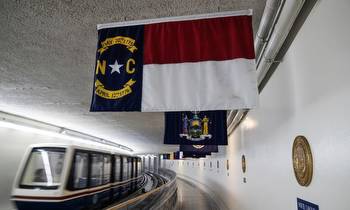Online Casino Stakeholders See Long Delay Before New Market Launches

Nearly 40 US jurisdictions have approved some form of legal sports betting since the Supreme Court struck down the federal wagering ban nearly six years ago.
New online casino state launches could be stalled for 18 months or more, a panel of gaming industry stakeholders reaffirmed Monday.
Though existing markets have seen significant financial growth in the past several years, there appears little political momentum for more regulated online casino states. Speaking at a panel focused on iGaming investors, several industry figures agreed that it could be a significant time until a new market becomes available.
“It’s just not coming to fruition. It’s an election year,” said Lauren Sieler, Founder of Global Gaming Advisors, during Monday’s Earnings+More: Capital Markets Forum. “Everything is going to die at the end of the year.”
Speaking from the New York Stock Exchange building, Sieler said that potential legalization candidates including New York, Illinois, Iowa, Indiana, Wyoming, Colorado, Maryland, and Maine have all seen efforts defeated this year. She said it could be another 12-to-18 months before these, or any other potential markets, could see political movement.
Hurdles continue delaying iGaming
Nearly 40 US jurisdictions have approved some form of legal sports betting since the Supreme Court struck down the federal wagering ban nearly six years ago. Only seven states have approved real money online casinos since New Jersey inaugurated the legal iGaming market in 20214.
Though only New Jersey, Pennsylvania, Michigan, West Virginia, Connecticut, Delaware, and Rhode Island allow online casinos, these seven states generate roughly half the revenue of the entire US-regulated sports betting market.
The significantly higher iCasino profit margins have encouraged gaming operators and investors to push lawmakers for greater legal adoption. That has proven a difficult sell.
Gambling expansion measures in most states have faced backlash from a wide range of the political spectrum. In New York, labor union concerns about iGaming, along with a delayed licensing of the state’s first-ever downstate commercial casinos, have thwarted iGaming, Sieler said.
Democratic politicians in multiple states have resisted iGaming over fears it would hurt existing brick-and-mortar casino workers, many of whom are represented by unions. Some elected officials on the left also oppose gambling over fears it exploits the financially disadvantaged.
Conservative lawmakers have spoken against gambling expansion of any variety over fears it will spark gambling addiction and other societal ills. Though roughly 1,000 casinos have opened in the past 40 years across nearly every state, iGaming opponents have resisted allowing “a slot machine in every pocket.”
Sports betting adoption has also benefited from its social aspect. It’s easy to talk about last night’s game, Sieler said Monday, but it’s still more taboo to talk about a night on the slot machines, be it in-person or digitally.
Online Casino Future
With future market launches likely a year or more in the future, gaming stakeholders are turning to improving their existing products.
US iGaming operators have seen tremendous improvements in technology implementation, payment processing, customer adoption, and marketing techniques, said Caesars Digital President Eric Hession. This has allowed online slots and table games to continue increasing revenues even without new markets.
The growth is also sparked by new innovations from third-party gaming tech providers including Aristocrat and Evolution. Live dealer games have also sparked revenue increases, panelists agreed Monday.
With legislation stalled, Hession said operators will look to take advantage of what they can control, such as new brand product launches. Caesars went live with the Caesars Palace Online Casino in August 2023 and it already makes up 50% of the company’s net online casino gaming revenue, Hession said.
Hession said this movement does not extend to an upcoming outside corporate acquisition. Panelists noted that gaming M&A activity has slowed since an early flurry following the federal wagering repeal.
With borrowing costs higher than just a few years ago, the likely potential online sports betting markets now almost all live, and new iGaming markets so uncertain, this relative corporate acquisition slow period will likely continue for the immediate future.
The “glacial” legislative pace remains the single biggest delaying factor in even more robust iCasino progress and ensuing investment activity, said Josh Swissman, a consultant at gaming industry firm GMA.
“We need to accelerate the regulatory environment. Governments have to move a lot more quickly than they have been,” Swissman said. “That’s the root of all of it.”































